Contents
The climate of Siberia and the Urals is characterized by a short summer period with a relatively modest temperature regime, but this does not prevent gardeners from growing heat-loving crops such as tomatoes, cucumbers, peppers and others. For a successful harvest, a caring owner not only artificially creates a favorable microclimate for the plant, but also selects special varieties of seeds. Thus, the article describes the best varieties of pepper for the Urals and Siberia, gives characteristics to their taste and agrotechnical features of growing crops in difficult climatic conditions.
Variety Selection Criteria
Among the wide variety of varieties, it can be quite difficult to navigate and choose the best one for growing in certain conditions. Of course, it’s great if the package indicates the region for which a particular variety was bred, but even in the absence of such recommendations, you can pick up an excellent pepper. So, for the climate of Siberia and the Urals, it is necessary to choose varieties:
- Low-growing. This will allow the plant not to spend a lot of time and effort on the formation of a lush, high-growing green mass;
- Early maturing. They will have time to give the crop as much as possible in the conditions of a short summer period;
- Cold-resistant. In the presence of weather “surprises”, the plant will be able to survive them painlessly. This is especially important for outdoor peppers;
- Adapted to specific growing conditions. In the areas under consideration, pepper is more often grown in greenhouses and greenhouses, so the plant must be resistant to diseases characteristic of a humid greenhouse microclimate.
If, when choosing seeds, the Siberian region is not indicated on the package, but the seeds meet the listed criteria, then you can safely give them preference. Below in the article are the varieties that are considered the best for cultivation in these regions.
Sweet varieties for the greenhouse
Bulgarian, sweet varieties of pepper are especially revered by gardeners. This is due primarily to the fact that in addition to excellent taste, the vegetable has a beneficial effect on the human body, since it contains a complex of vitamins and mineral salts. Growing sweet peppers in your garden is quite simple. The following greenhouse varieties are best suited for cultivation in Siberian and Ural climatic conditions:
Blondie F1
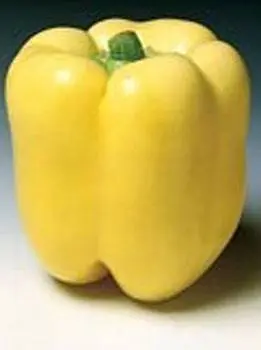
A unique hybrid with an ultra-early ripening period: already 60 days after sowing the seed, you can try the first harvest. Peppers have a beautiful appearance: the color is yellow, bright, glossy, the shape is cuboid with a clear drawing of the edges. The diameter of the vegetable is about 10 cm. One pepper weighs a little over 140 g. The pulp of the pepper is thick and juicy.
The variety is disease-resistant, the height of its bushes varies from 60 to 80 cm. The hybrid is perfectly adapted to greenhouse conditions. The return of fruits with proper feeding of the plant is more than 8 kg / m2.
Venti
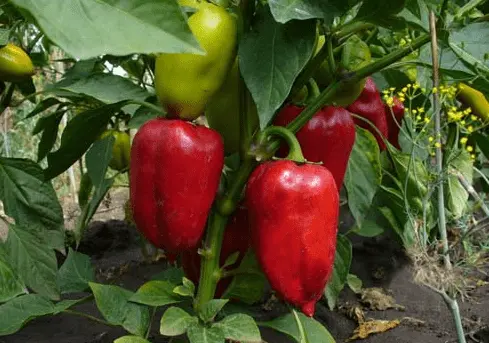
Variety “Venti” produces fruits of cream or red color, resembling a cone in shape. Their size is small: length is about 12 cm, weight is about 70 g. For the first peppers to ripen from the day of sowing, about 100 days should go. The taste of the vegetable is excellent, the skin is thin. However, peppers in this class are not particularly fleshy with a wall thickness of less than 5,5 mm.
The bush is undersized, an adult plant does not exceed 50 cm. The yield of the variety is 5 kg / m2.
Eroshka
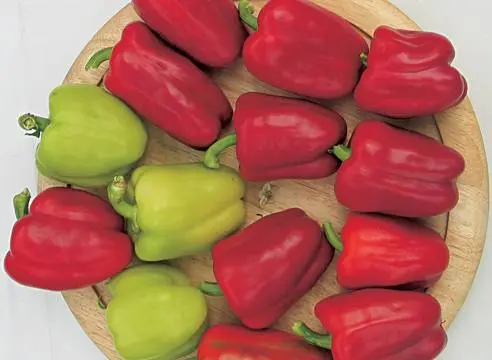
This variety has a lot of fans, thanks to the unpretentiousness of the plant, the compactness of the bush and the amazing taste of the fruit. It is recommended to grow it in protected ground. The height of the bush up to 50 cm allows you not to tie up the plant. Seeds for seedlings are recommended to be sown in March, and after about 100 days after that it will be possible to evaluate the taste of pepper. It is worth noting that the culture has protection against many diseases.
Peppers “Eroshka” are painted in light green or red. Their shape is cuboid, with a diameter of just over 10 cm. The average weight of a vegetable is 150 g, its pulp is tender, however, not so fleshy – the wall thickness of the pepper is up to 5 mm. With the help of this variety, it will be possible to harvest more than 7 kg / m2.
Cardinal F1
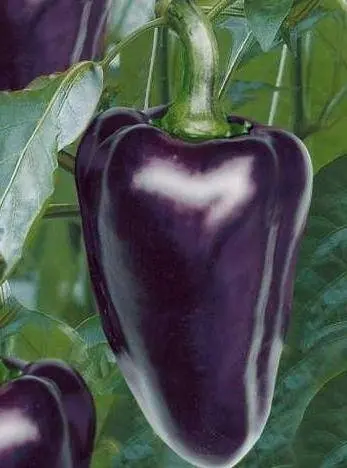
Hybrid fruiting purple peppers. They differ not only in color and excellent external and taste qualities: the shape of the fruit is cuboid, with a height of up to 15 cm, the skin is thin, tender, the flesh is juicy, fleshy (wall thickness 8 mm). The average weight of one vegetable varies from 250 to 280 g.
The best time for sowing seeds for seedlings is March. The variety has an ultra-early ripening period – 90 days. A plant of medium height (up to 100 cm), but due to the rapid development of greenery and the formation of fruits, it is excellent for Siberian conditions. It should be noted that the yield of the variety is excellent – up to 14 kg / m2.
Korenovsky
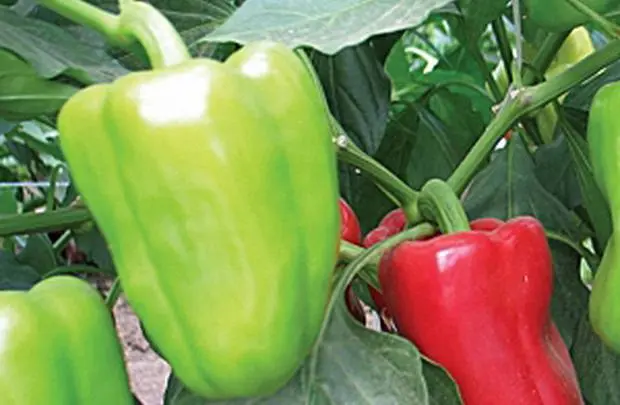
The plant is low – up to 60 cm. Great for growing in a greenhouse, has protection against diseases. The period from sowing to fruiting is approximately 110 days.
Peppers are formed on the bush at the same time green and red. Their shape is cone-shaped, up to 15 cm long. Each pepper weighs about 150 g. The taste of the variety is excellent: the pulp is sweet, juicy. However, the wall of the vegetable is not very thick (up to 4,5 mm). The crop yield is 4,5 kg/m2.
Latino F1
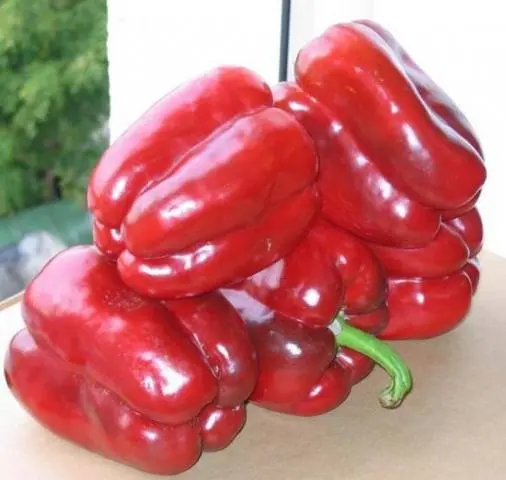
Despite the “warm” name, this variety grows well and bears fruit in harsh climatic conditions. At the same time, the culture is able to bear fruit in a volume of up to 14 kg / m2, which makes it widely loved by experienced and novice gardeners alike. The external qualities of the fruit are excellent, you can evaluate them in the photo below. Bright red color, cuboid shape, glossy surface give the pepper a special look. The taste of the fruit is excellent: the walls are thick (up to 1 cm), the pulp is tender, unusually juicy. Each pepper weighs about 200 g.
The variety is grown mainly in greenhouse conditions. Peppers ripen after 110 days from the day of sowing. To obtain an early harvest, it is recommended to grow seedlings. With seed sowing in February-March. The height of an adult bush reaches 100 cm, therefore, in order to accelerate its growth, it is necessary to pay special attention to nitrogen-containing dressings in the process of growing a crop. The bush needs a mandatory garter.
Maria F1
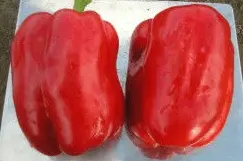
This hybrid is considered one of the best varieties for the climate of the Urals and Siberia. The height of its bush does not exceed 80 cm. The fruits ripen quite quickly – after 110 days from the date of sowing. The crop yield, though not a record, but stable – 7 kg / m2. It is these parameters that are collected in the optimal ratio, which allows you to get a delicious crop of peppers in a greenhouse, regardless of weather conditions. The culture is resistant to a number of diseases.
Peppers “Maria F1” are red, 8 cm long. The shape of the fruit is semi-round, the flesh is 7 mm thick and covered with a thin peel. One fruit weighs an average of 100 g.
Fidelio F1
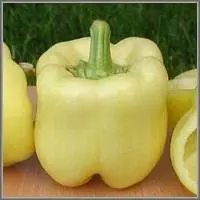
The hybrid is distinguished by a very early ripening period of peppers. Already 90 days after sowing, you can enjoy a delicious vegetable. Its color is silvery-white, a little over 10 cm long. The flesh is thick (8 mm), tender. The pepper weighs approximately 170 g.
It is necessary to grow a variety in a greenhouse, with the placement of bushes of 4-5 pieces per 1 m2 soil. The height of an adult plant reaches 90 cm. With proper care, the hybrid gives off sweet, tasty peppers in a volume of up to 14 kg / m2.
Yarik
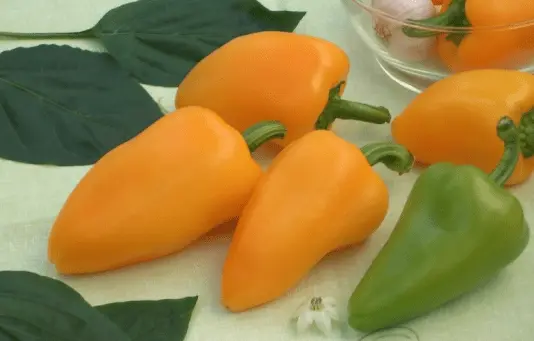
Compact, low-growing plant with light yellow fruits. The height of an adult bush is only 50 cm, however, the yield is high – 12 kg / m2. The fruiting period of the crop is short – just over 85 days.
Cone shaped peppers. Their length reaches 15 cm, weight 100 g. The pulp of the fruit is distinguished by aroma, juiciness, sweetness. Great for fresh salads, stuffing, canning.
These varieties do not have a special resistance to cold, but at the same time they have protection from a number of diseases characteristic of a greenhouse microclimate, which makes it possible to successfully grow a crop in protected ground.
Sweet varieties for open ground
Building a greenhouse is not always possible, but at the same time, you should not refuse the idea of uXNUMXbuXNUMXbgrowing peppers in your garden. After all, even for harsh climatic conditions, there are special varieties that are resistant to stress and cold. Among such cold-resistant crops, it is worth highlighting the following:
Firstborn of Siberia
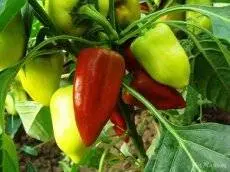
A low-growing variety, with a bush height of not more than 45 cm. The crop ripens quite early – after 115 days from the moment the seed is sown. For cultivation on open ground, it is necessary to prepare seedlings in advance.
Red and yellow peppers are simultaneously formed on the bush. Their difference is a significant wall thickness – up to 10 mm. Peppers are pyramid-shaped with a height of 9 cm. The average weight of a small pepper is 70 g.
Siberian
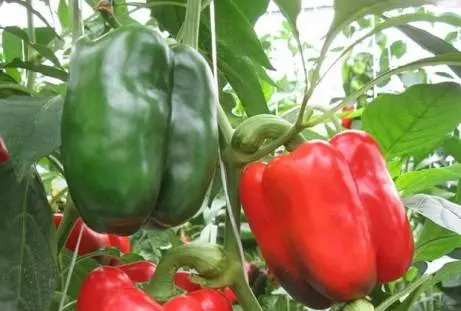
The uniqueness of this northern variety lies in the fact that a small bush up to 60 cm high forms massive, large peppers, weighing up to 150 g in a volume of up to 7 kg / m2. It takes no more than 115 days for the fruit to ripen. At the genetic level, the variety has cold resistance, which allows it to be grown outdoors and not lose crops in the presence of adverse weather conditions.
The taste of the vegetable is amazing: thick flesh has a bright aroma and sweetness. The thin skin makes the vegetable particularly tender.
Novosibirsk
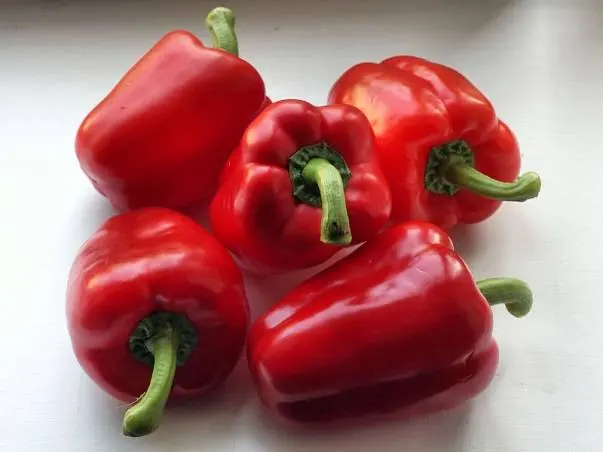
The variety “Novosibirsky” was bred through the efforts of Siberian breeders specifically for growing in the appropriate climate. The result of their labors was pepper, with a bush height of up to 1m. Its first crop ripens in 100 days from the moment of planting the seeds.
The peppers themselves are bright red, small, weighing up to 60 g and a wall thickness of just over 6 mm.
These varieties are great for growing outdoors, however, it would be useful to follow some rules:
- you should determine a place in the garden, protected from the winds;
- use seedling cultivation method;
- at low temperatures, a film cover on the arcs should be provided;
- fertilizing the soil will warm the root system and give the plant the necessary strength and resistance to stress.
Hot peppers
In addition to sweet varieties, some gardeners grow hot peppers, some of which are even used for medicinal purposes. They can also be grown in cool climates. Suitable varieties for this are:
Arkhangelsky 147
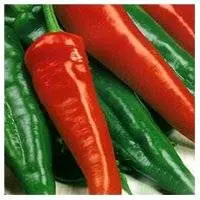
It is the fruits of this variety that are used not only in cooking, but also for medical purposes. It must be grown in open ground, seedlings. The height of the plant is small – up to 70 cm. Peppers ripen in 122 days, however, such a long ripening period, taking into account cold resistance, is not a drawback.
Fruits of green and red color are formed on one bush. Their length is not more than 8 cm, weight is up to 10 g. The pepper is coarse and very sharp, its wall thickness is 1-2 mm.
Pepper Homer
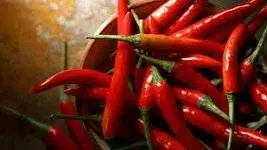
The fruits of this variety are widely used in the preparation of hot spices and for canning. Pepper pulp is semi-sharp, very fragrant. The wall thickness of the fetus is thick (3-4 mm). The weight of one pepper reaches 30 g.
You can grow a crop in open ground or under cover. Plant height up to 75 cm allows planting bushes of 3-4 pieces / m2. The fruits ripen 112 days after sowing the seed. The plant bears fruit in a volume of up to 3,5 kg / m2.
Lightning
For growing in greenhouses, the Lightning series is excellent. They are represented by three varieties “Golden Lightning”, “Red Lightning”, “Black Lightning”. Photos of these peppers can be seen below.

These varieties have the same agrotechnical characteristics: the fruits ripen in about 95 days, the height of the bush is just over 1 meter, the yield is up to 8 kg / m2. Peppers of the corresponding colors up to 12 cm long, weigh about 100 g. Their shape is cone-shaped.
Conclusion
You can learn more about the features of growing pepper, the rules of planting and care in the video:
Peppers contain a huge amount of vitamins and minerals. At the same time, a “storehouse of vitamins” can be grown in the garden without much difficulty. Special varieties allow the plant to be cultivated in difficult climates, regardless of the presence or absence of a greenhouse. With some effort and following the rules of care, even a novice gardener is able to get a massive crop of healthy peppers in his garden.









